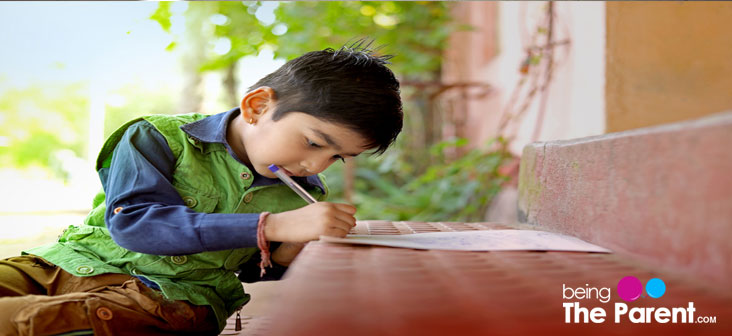
All children are unique. And most of us parents tend to think, at some point or the other, that our children might even be gifted. You might have noticed occasional sparks of brilliance or a friend or relative might have pointed out that your child is set apart from his or her peers. Whatever may be the case, you might be wondering if your child is gifted and how to find that out. Here is an article that might help you.
Who Is A Gifted Child?
Giftedness could be a result of a combination of genetics and environmental factors. This means that a child may be gifted if:
- The child is born with a higher a number of neural connections in the brain and they live in an environment that helped retain and further develop these neural connections
- The child is born with a normal number of neural connections in the brain but raised in an environment that gave him a lot of opportunities to increase the number of neural connections
In short, one common characteristic of all gifted kids is that they all have denser and more efficient neural connections that their peers.
How Is “Giftedness” Measured?
The traditional way of measuring giftedness is screening methods such as IQ tests. Usually, teachers in schools also keep an eye out for gifted children. But as parents, one cannot rely on teachers alone because not all of them are trained to spot gifted children. Also, contrary to popular beliefs, gifted kids do not always get high grades and are not always “teacher’s pets”. Sometimes, they are very distracted and appear to be disinterested in studies. While this is original because they are faster than their peers which lead to boredom, some see it as disinterest towards academics or Attention Deficit Hyperactivity Disorder (ADHD). All these mean that it might be a good idea for parents to either watch out for signs of the gifted child themselves or get your child privately checked.
What Are The Characteristics Of A Gifted Child?
The problem with identifying a gifted child is that no two gifted children are alike (much like every child is unique). As a result, there are no universally accepted signs of giftedness. However there are some characteristics that many gifted children possess. However, you need to remember that not all gifted children possess all these traits. Further, there are gifted children who possess none of these traits and yet are gifted in their own rights (hidden gifts). So, treat this list only as indicative. And assess your child relative to other kids her age so that you have some context.
The characteristics can be categorized into three:
- Language Skills
- Strong vocabulary as compared to peers
- Ability to string together difficult words to form longer and complex sentences
- A good understanding of metaphors and idioms
- Understanding of word nuances and double meanings
- Ability to understand and converse in multiple languages with ease
- Tendency to ask questions and ability to understand long explanations give to their questions
- Ability to understand complex instructions with multiple stages
- Learning Skills
- Excellent memory
- Fast learner
- Ability to grasp things quickly
- Ability to crystallize their thoughts quickly
- Showcase advanced insights and understanding
- An understanding about the world around them that is uncommon for the age
- Preference to read more than physical activities
- Creative thinking
- Soon to develop fine motor skills. Many gifted children are great at tasks that require fine motor skills and problem-solving abilities – like sorting beads, Lego, jigsaw puzzles and so on
- An interest to talk to children older than them or adults
- A lot of patience to learn things that are of interest to them. And a lack of patience and boredom for all other topics
- Emotional Traits
- Emotionally intense than peers
- Showcase more empathy and sensitivity towards others
- Strong leadership qualities
- Liking “me-time”, that is, being with self. They like spending time with children older than them (children of their mental age) and adults. But other times, they like to be alone doing reading, writing, daydreaming etc
- Appreciation for nature
- Appreciation of art
- Ability to think and act quickly
As we said before, many kids exhibit these traits. What is important is to gauge them with relation to other kids of their age and see if your child is remarkably ahead of their peers.

Parenting Your Gifted Child
If you have a gifted kid you will be required to do things a little different in order to help her reach her full potential. Here are a few tips that you can make a note of:
- Provide intellectual challenges to your child: Your child may finish her tasks faster than the other kids in the school. As a result, she may get bored and uninterested and may underperform in her early classes. She will slowly understand that most often she doesn’t need much practice or put in the same amount of efforts that other children are putting. This could lead to her developing an inferiority complex. So you can support her by giving her tougher intellectual challenges. You can engage her in different games and activities that will keep her motivated and this will she can practice things she learns at school in more fun way
- Compliment your child: You know your kid is talented, and she gives you many reasons to be proud of her. Make sure that you appreciate to her but be careful how you do it. Your kid may be aware of her gifted talents but as a parent it is imperative for you to acknowledge her hard work and intellectual abilities. Try and compliment her for the small things she does and make her feel proud of it. Make it a point to boost your kid’s confidence by making her realize her worth rather than just taking it for granted all the time
- Enjoy the time together: You can connect better if you have a gifted child and can use it to have some fun times together. May sure you use your kid’s talent to bond better and form a perfect parent- child team. Talk to her and teach her about the world and other important things. You can also have some fun moments together
- Don’t treat her as an adult: Although your kid connects well with you but make sure you don’t treat her like an adult. She will always remain your child and will constantly need your guidance and protection not matter how gifted she is. Make sure you are there to guide her and there for her when she need you and make sure she knows about it and trusts you. Don’t put her under pressure by letting her take major decisions. This can scare her and hamper her confidence if she fails or mishandles any situation
- Don’t over-burden her with schedules: Don’t over burden your child with tasks. Although you have a gifted child and you want the best for her by exposing her to various activities but make sure you give her enough free time and let your child think on her own and come up with some wonderful ideas. This will make her more active and involved in task on hand. If she follows a strict schedule there are chances that she will not get enough time to rest and recuperate and may not be as productive as you want her to be
- Don’t push your child for perfection: You may have a gifted child but don’t push her for perfection. Being gifted does not mean she has to excel in everything she does. Your child may be good at something but may not be interested in something else. So it is necessary that you identify the area she is good in and focus on that rather than expecting her to be a master of all trades. This will unnecessary put pressure on her and she may lose interest. So as a parent hone her skills and encourage her to take up things she is good at so that she can use her talents to the maximum
Having a gifted child can be a big blessing, but as a parent, you have to make sure that you give your child the right opportunities to grow and at the same time cherish her childhood. So, set your expectations right and be there for your kid at all times.

